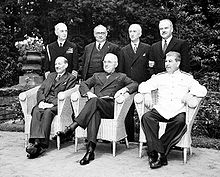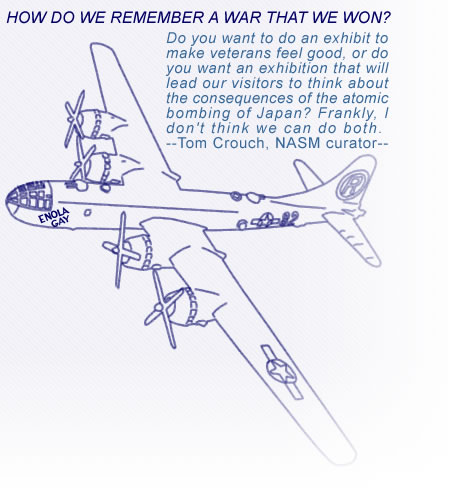
(Planning the Post-War World. Potsdam Leaders, July, 1945)
The dining room of Tracy O’Grady’s Willow restaurant is a contrast to the bar area where I normally hang out. It is much lighter and airier than the dark wood area, though it shares a certain intimacy. It is all white table-cloths and spare elegant furnishings with solicitous staff. I do not make enough money to continue on from the bar to the dining room as much as I would like. That is why Tracy established the $5 “neighborhood bar menu” to temp the regulars into a snack, even if we don’t stay for dinner all the time.
This meal was something in the way of a special occasion, though. The Good Doctor was joining Mac and me for a meal after drinks. He is always late, having One Of Those Jobs here which involves talking to other Very Busy People whose schedules are , studied the menu, though it really doesn’t matter at Tracy’s Willow restaurant. Anything on it is good. If an item it is not composed of the freshest and tastiest of ingredients, it wouldn’t be there.
I had the chateaubriand-for-two one night a few months ago, split with my older boy to commemorate some event, and it was better than anything I might have had at a specialty steakhouse. Creamed spinach and all the sides came with it, and the meal was extraordinary. I asked Tracy about it, since I haven’t seen it since, and it was just something that came from la boucherie she frequents in the morning in her eternal quest for the finest ingredients.
The lamb, for example, is New Zealand and always good. I think it is one of the recipes she cooked for the Bocuse D’or competition in Europe, the one that required the custom serving set that now hangs in the narrow hallway that leads to the rear entrance and the restrooms past the private dining room.
I settled on the monkfish wrapped in bacon, which I would not have done anywhere else. The monkfish is supposed to be a real ugly creature in person, but much more approachable when filleted, sort of like life, or history.
Mac has a wonderful full-service dining facility at the Madison where he lives. He does not need the amenities and care that some of the other residents do, but he finds the burden of not having to cook a nice convenience. When he comes to Willow, he drives the Jaguar from the garage under the building to a place he normally finds right in from of the restaurant, minimizing the risk of the crossing Fairfax Drive on foot.
This particular night I had strolled from the office and stared down the traffic from the dubious safety of the wide white lines that VDOT has lately begun placing with the apparent intent to confuse both motorists and pedestrians. Cars are supposed to stop for people, who have become emboldened and dart out unexpectedly in mid-block.
I made it almost all the way, edging uneasily in front of a gigantic and somewhat ambivalent Escalade SUV. Clear of the massive fender I looked up to see a hurtling bicyclist coming directly for me. My heart leapt into my mouth and I jumped for the safety of the curb.
The city is plagued by these Lance Armstrong wannabees who brook no opposition to their speedy progress, and view the rest of us with contempt.
I suspect that is why Mac drives, even though The Madison is only a block away. Spry as he is, time has taken a half-step off his best times.
He has had some times, and it is one of those extraordinary pleasures to have him as my own personal time machine. We had been talking about the estimates process that supported the planning for the invasion of Japan. I had a stack of bar napkins in the pocket of my suit jacket that I would try to unscramble later, and was increasingly aware that having lived the experience, Mac was one of the very few on the planet whose opinion was worth counting.
He decided to take the safe bet on the lamb. The Good Doctor opted for a table order of the Warm Gruyere Cheese Puffs with Black Truffle Sauce and one of the signature grilled flatbreads with calamari ali olio, garnished with roast garlic, three cheeses and oven dried tomato.
The Doctor is a historian by trade as well as a reserve Navy Captain, and he has been trying to unravel the history of the Air Intelligence trade. Mac is the last man standing who recalls what Admiral Forrest Sherman had in mind for the craft that emerged from World War Two, morphed through the chaos of Korea, and provided the front-line support to the Nuclear Navy of Admiral Arleigh Burke.
I was interested, too, since if there was something I would have put on my tombstones when this is all over, it would be” “Socotra. Air Intelligence Officer. Cold War, GWOT, OCO.”
So, the Doc was trying to steer things around to Forrest Sherman, and I was determined to understand the last months of World War II.
When the waitress left us- a pert young woman in a white blouse and dark apron I did not recognize- I made a stab at keeping us in July of 1945. “I was just in Potsdam in May. It was raining like hell and my lovely associate and I looked like drowned rats by the time we hiked just a couple blocks from the train station. We had intended to tour Cecilienhof, the home of Crown Prince Wilhelm Hohenzollern where the Big Three held the conference to determine the future of the world. Never got there. We took refuge in the nearest church- St. Nikolaikirche. There was a room off the nave that had a history of the restoration of the place and I was blown away by what the town must have looked like when the wartime leaders arrived. It was mostly rubble.”
Mac nodded. “I imagine so. It was a long way from where we were on Guam, and we knew that VE Day meant that VJ Day was inevitable. It was just that the Japanese didn’t seem to agree.”
Doc said that the militarists had been frantically been trying to negotiate for a cease-fire with the Russians before the Conference, and were willing to make concessions in Sakhalin, Manchuria and some other territory to get it. Harry Truman had been president for less than three months, and FDR, failing in health had been a softy as far as Uncle Joe Stalin was concerned.
“He once said he had a hunch that Stalin was not the kind of man to take advantage of him, and that he would give him everything he possibly can and ask for nothing from him in return, noblesse oblige, and he won’t try to annex anything, working together for a world of democracy and peace.”
“That is a pack of crap as bad as W looking into Colonel Putin’s eyes an seeing a good soul,” I said.
Doc rolled his eyes. “There is a whole body of scholarship that holds that the US cynically held the secret of the bomb in Truman’s back pocket and sacrificed civilian lives at Hiroshima and Nagasaki to demonstrate to the Soviets that there was really a new world order and the US was large and in charge.”
“Those were the same idiots who wanted the Enola Gay exhibit on the fiftieth anniversary at the Air and Space Museum to be a big apology for American war crimes.”
Doc nodded. “It was the curator of the collection, Jim Crouch, who said it could either be a ‘feel good’ exhibition, or a testament to the horror of war. It could not be both in his mind.”

(Lehigh University graphic on the history wars)
I said that everyone who saw it who had a dad that would have been there for the apocalypse would have disagreed with him.
“They started too soon,” said Mac. “Too many of use were still alive who remember. They had to change the story board to reflect the estimates of American casualties. “As you might imagine, I have followed this with a great deal in personal interest. In the CIA study of the end of the war are the minutes of a meeting at the White House with Truman, his chief of staff Admiral Leahy, George Marshall and Admiral King. They talked about all sorts of factors, but the one that was preeminent was the number of American kids who were going to die in the assault. Our estimates helped influence the course of the discussion.”
“Did they talk about the Bomb? Did they all know?” I asked.
The Admiral looked at me sadly. “The President, Chief of Staff, Secretary of War and CINCFLEET? Come on. Of course they did.”
“And the decision was to use the bomb.”
“Of course. And it saved a lot of lives, American and Japanese, if our estimates from CINCPAC Hill were correct. I think they were. The revisionists will just have to wait until I am gone to say otherwise.”
The waitress returned with another glass of that Chardonnay for me, one for the Doc and a glass of water, no bubbles, for the Admiral.

(Colonel Paul Tibbet’s Enola Gay in the loading process for a special mission, August 5, 1945. The mission was accomplished the next day at Hiroshima. Air Force picture.)
Copyright 2017 Vic Socotra
www.vicsocotra.com
